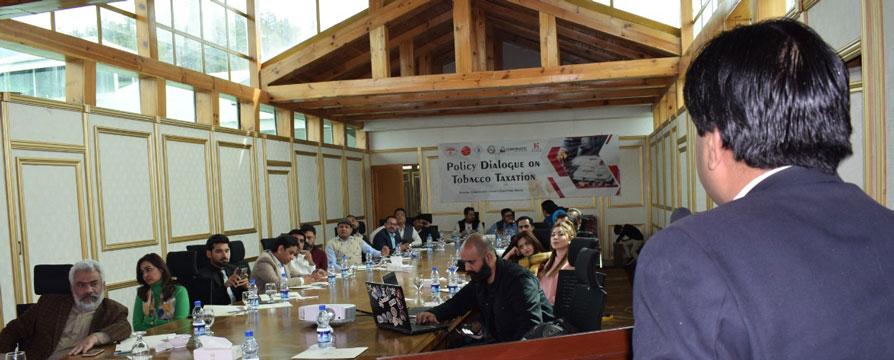MURREE: Besides being a deadly substance producer, Pakistan’s tobacco industry is causing Rs 615 billion health burden on the national exchequer. No tax is imposed on tobacco during three and a half years tenure of Imran Khan and we demand to impose at least 30 percent tax on tobacco which is also recommended by WHO, said experts during a policy dialogue held at a local hotel in Murree.
Malik Imran Ahmad, Country Head Campaign for Tobacco Free Kids told the media that smoking is a silent killer in our society, with a total of 29 million active smokers. Of which 170,000 die each year due to tobacco related diseases. Tobacco causes a health burden of Rs. 615 billion due to loss of productivity and tobacco-related diseases, while the revenue collected from the tobacco industry is only Rs 120 billion. Higher taxes on tobacco is essentials to mitigate this burden. Unfortunately, in the last three years taxes could not be increased because Tobacco Industry misleads the govt with illicit trade figures. Increasing taxes on tobacco is the most effective policy to reduce consumption and generate additional funds for the government.
He further added that Pakistan should increase the excise rates by at least 30% on cigarettes to ensure the reduction in cigarette consumption and the growth of tobacco revenue.
Dr. Ziauddin Islam, former Technical head, Tobacco Control Cell, Ministry of Health & Former technical focal person of Govt of Pakistan to WHO FCTC, while speaking to the seminar said that tobacco consumption among youth in Pakistan is unacceptably high, and their use of this addictive product is harming their mental and physical health.
Country’s youth is the main target of tobacco industry
Pakistan’s young people make up 64 % of the population which can easily become a target for the tobacco industry. He further stated that approximately 1200 children between the age of 6 – 15 years start smoking every day (Tobacco Control Cell Factsheet). Youth is the key target of the tobacco industry. The industry considers adolescents as replacement for smokers dying of tobacco use.
Regrettably, cigarettes in our country are available at the cheapest rates in the region, which makes them affordable for youth. He demand for raising tobacco taxes, as children are price sensitive, increasing tobacco taxes to 30% will help prevent youth from starting to smoke, he added.
Khalil Ahmed Dogar, program Manager Society for the Protection of the Rights of the Child (SPARC) said it is necessary to constantly engage the media to help report evidence of the harms of smoking and support tobacco control policies. This tactic remains vital as the rise of social media and rapid circulation of misinformation threaten trust in public health advice.
The media needs to play its role and highlight the violations of tobacco control policies and expose the deceptive tactics of the tobacco industry.
The government needs to adopt a National Tobacco Control Policy, that ensures the reduction in tobacco consumption, improved public health, and guaranteed child education and nutrition, he added.








